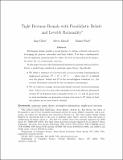| dc.contributor.author | Chen, Jing | |
| dc.contributor.author | Micali, Silvio | |
| dc.contributor.author | Pass, Rafael | |
| dc.date.accessioned | 2016-01-21T00:56:21Z | |
| dc.date.available | 2016-01-21T00:56:21Z | |
| dc.date.issued | 2015-07 | |
| dc.identifier.issn | 0012-9682 | |
| dc.identifier.issn | 1468-0262 | |
| dc.identifier.uri | http://hdl.handle.net/1721.1/100963 | |
| dc.description.abstract | Mechanism design enables a social planner to obtain a desired outcome by leveraging the players’ rationality and their beliefs. It is thus a fundamental, but yet unproven, intuition that the higher the level of rationality of the players, the better the set of obtainable outcomes. In this paper, we prove this fundamental intuition for players with possibilistic beliefs, a model long considered in epistemic game theory. Specifically,
• We define a sequence of monotonically increasing revenue benchmarks for single-good auctions, G[superscript 0≤]G[superscript 1≤]G[superscript 2≤]···,where each G[superscript i] is defined over the players’ beliefs and G[superscript 0] is the second-highest valuation (i.e., the revenue benchmark achieved by the second-price mechanism).
• We (1) construct a single, interim individually rational, auction mechanism that, without any clue about the rationality level of the players, guarantees revenue G[superscript k] if all players have rationality levels ≥ k + 1, and (2) prove that no such mechanism can guarantee revenue even close to G[superscript k] when at least two players are at most level- k rational. | en_US |
| dc.description.sponsorship | United States. Office of Naval Research (Grant N00014-09-1-0597) | en_US |
| dc.language.iso | en_US | |
| dc.publisher | The Econometric Society | en_US |
| dc.relation.isversionof | http://dx.doi.org/10.3982/ECTA12563 | en_US |
| dc.rights | Creative Commons Attribution-Noncommercial-Share Alike | en_US |
| dc.rights.uri | http://creativecommons.org/licenses/by-nc-sa/4.0/ | en_US |
| dc.source | Other univ. web domain | en_US |
| dc.title | Tight Revenue Bounds With Possibilistic Beliefs and Level-k Rationality | en_US |
| dc.type | Article | en_US |
| dc.identifier.citation | Chen, Jing, Silvio Micali, and Rafael Pass. “Tight Revenue Bounds With Possibilistic Beliefs and Level-k Rationality.” Econometrica 83, no. 4 (2015): 1619–1639. | en_US |
| dc.contributor.department | Massachusetts Institute of Technology. Computer Science and Artificial Intelligence Laboratory | en_US |
| dc.contributor.department | Massachusetts Institute of Technology. Department of Electrical Engineering and Computer Science | en_US |
| dc.contributor.mitauthor | Micali, Silvio | en_US |
| dc.relation.journal | Econometrica | en_US |
| dc.eprint.version | Author's final manuscript | en_US |
| dc.type.uri | http://purl.org/eprint/type/JournalArticle | en_US |
| eprint.status | http://purl.org/eprint/status/PeerReviewed | en_US |
| dspace.orderedauthors | Chen, Jing; Micali, Silvio; Pass, Rafael | en_US |
| dc.identifier.orcid | https://orcid.org/0000-0002-0816-4064 | |
| mit.license | OPEN_ACCESS_POLICY | en_US |
